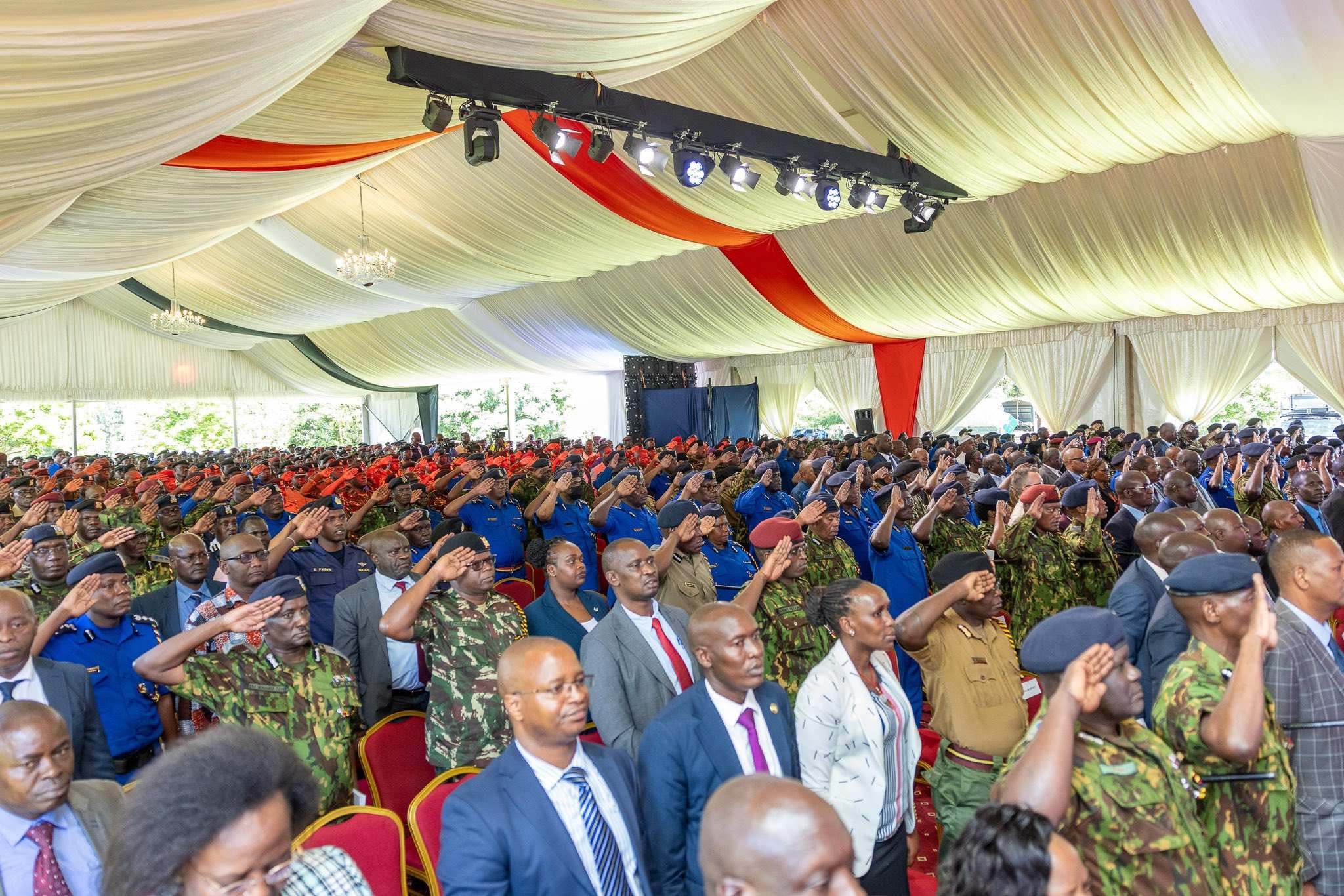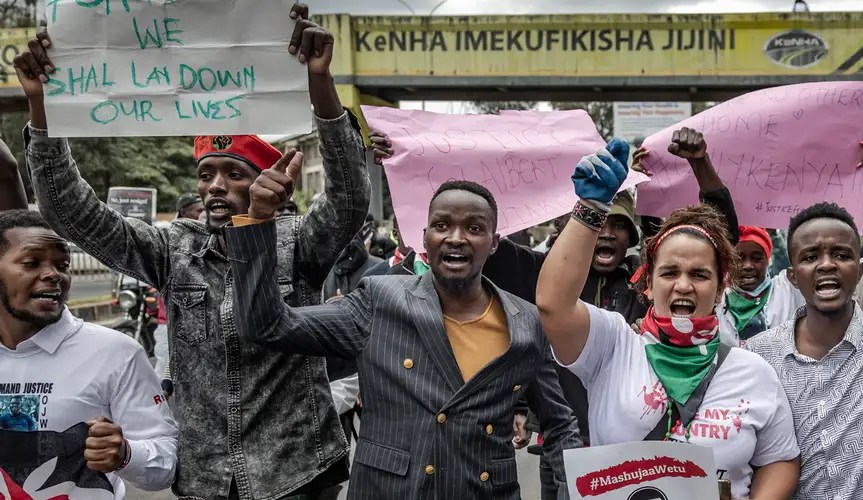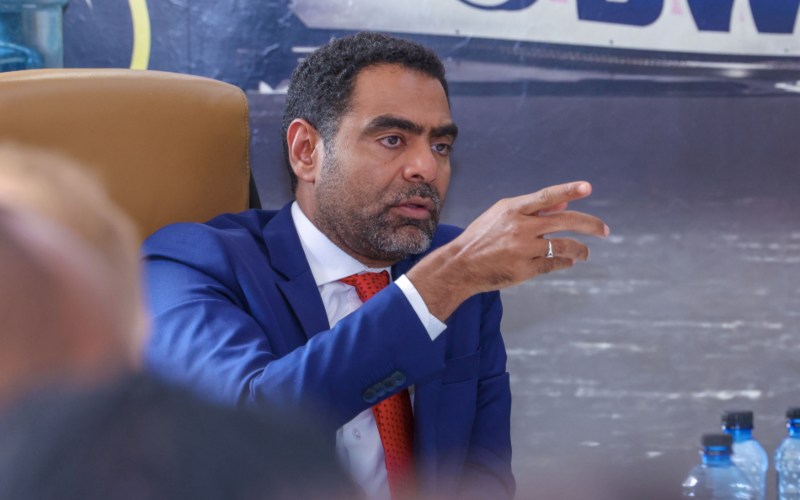Inside Ruto's Sh28 billion plan to modernise National Police Service

Kindiki had earlier said the public raised concerns about the disappearance of files at police stations, hence the digital OBs will help to keep tabs on government records.
The government has embarked on a transformative Sh28 billion plan to modernise the National Police Service (NPS), with the digitisation of the police Occurrence Book (OB) taking centre stage.
The ambitious plan aims to enhance transparency, efficiency, and accountability within the police force, a move President William Ruto described as crucial to modernising the country's security sector on Friday.
More To Read
- Reports urge mindset shift, collaboration for effective community policing in Kenya
- IG reshuffles top police ranks as six senior officers moved
- Senators order agencies to reconcile records on injured police officers’ claims amid conflicting figures
- High Court suspends nationwide police recruitment over fresh legal challenge
- Government seeks out-of-court deal to end police recruitment stalemate
- Police recruitment exercise postponed indefinitely after court order
"We must ensure we digitise operations, including the famous OB (Occurrence Book) so that nobody compromises entries on the OB," he said.
The President spoke at the launch of the National Police Service and State Department for Correctional Services Strategic Plans for 2023-2027 at the Kenya School of Government in Nairobi.
The OB, a critical record-keeping tool for police stations, has been notorious for instances of tampering, manipulation, and missing files.
The digitisation effort aims to eliminate such issues, making case entries uneditable and easily traceable.
In July 2023, the government began digitising the OB in select police stations, with 76 stations in and around Nairobi already transitioning to the new system.
The plan is set to expand across the country, addressing longstanding concerns over corruption and the manipulation of crime records. This will ensure that police operations are more transparent and accessible to oversight by various command structures.
"By digitising the OB, we aim to guarantee transparency and accountability in police operations at the station level. The reports entered will be subject to monitoring by ward, county, and regional commanders, the Inspector General, and other top commanders," Ruto added.
Former Interior Cabinet Secretary Kithure Kindiki had earlier said the public raised concerns about the disappearance of files at police stations, hence the digital OBs will help to keep tabs on government records.
The digitisation of the OB is just one part of a much larger reform agenda aimed at modernising the entire National Police Service.
President Ruto outlined several key areas of focus, including the acquisition of new equipment, vehicles, and weapons to enhance police operations across the country.
"I want to commit that I intend to see the process of modernisation to completion in the next two years so that we can have the equipment, vehicles and ammunition necessary to protect our country," he said.
 President William Ruto during the launch of the National Police Service and State Department of Correctional Service Strategic Plans 2023-2027, Nairobi on December 13, 2024. (Photo: PCS)
President William Ruto during the launch of the National Police Service and State Department of Correctional Service Strategic Plans 2023-2027, Nairobi on December 13, 2024. (Photo: PCS)
Under the plan, the government will spend Sh2 billion in the initial stages to improve police services.
In addition, 1,000 new vehicles will be procured next year, with plans for another 2,000 vehicles to address the chronic shortage of transport at police stations.
This is aimed at increasing mobility for officers and improving their ability to respond to emergencies in real time.
To improve the welfare of police officers, the government has also completed 582 new housing units for officers and is constructing an additional 1,000 units, to build 17,000 new units in total.
"We intend to make sure that many of our policemen and women, who discharge a very sensitive responsibility of protecting all of us, work in conditions that help them discharge that responsibility," Ruto said.
Tackling corruption
As part of the modernisation agenda, Ruto also emphasised the need for strict oversight to eliminate corruption and improve the reputation of the police force.
"We must end the culture of extortion, bribery, and many other forms of corruption, which have inflicted a devastating stain on the credibility of the service," he added.
The government is actively strengthening oversight mechanisms, including the Internal Affairs Unit and other independent bodies such as the Independent Policing Oversight Authority (IPOA) and the Ethics and Anti-Corruption Commission (EACC).
The aim is to ensure police officers adhere to high ethical standards and that complaints are properly addressed.
"We are taking decisive action to ensure the NPS stays ahead of emerging threats," President Ruto said, highlighting the importance of technology in policing.
The integration of digital tools, such as drones for border security and advanced cybersecurity systems, will play a key role in the government's strategy to enhance law enforcement capabilities.
Alongside police reforms, the Sh28 billion plan also covers the Kenya Prison Service, with the construction of 28,000 new housing units for prison officers.
President Ruto also announced that the State Department for Correctional Services would begin a vehicle leasing programme to improve transport for the Kenya Prison Service.
Additionally, the National Police Service is prioritising the mental health and training of officers as part of the five-year strategic plan, which also includes improvements to the physical and mental well-being of personnel in both the police and prison services.
This multi-faceted modernisation plan also places a strong emphasis on officer welfare, including salary increases and better insurance packages, as well as human capital development.
The government is also consulting police officers on their preferred uniforms as part of efforts to improve morale.
Prime Cabinet Secretary Musalia Mudavadi underscored the importance of people-centred policing, urging the police leadership to engage more constructively with citizens.
"Constructive engagement with citizens is necessary to resolve emerging conflicts in the delivery of police and correctional services. We must seek to promote trust and understanding that will ensure the security of the citizens," he stated.
Top Stories Today












































